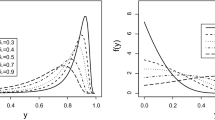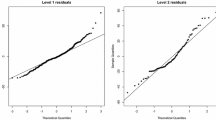Abstract
Discretized multivariate normal structural models are often estimated using multistage estimation procedures. The asymptotic properties of parameter estimates, standard errors, and tests of structural restrictions on thresholds and polychoric correlations are well known. It was not clear how to assess the overall discrepancy between the contingency table and the model for these estimators. It is shown that the overall discrepancy can be decomposed into a distributional discrepancy and a structural discrepancy. A test of the overall model specification is proposed, as well as a test of the distributional specification (i.e., discretized multivariate normality). Also, the small sample performance of overall, distributional, and structural tests, as well as of parameter estimates and standard errors is investigated under conditions of correct model specification and also under mild structural and/or distributional misspecification. It is found that relatively small samples are needed for parameter estimates, standard errors, and structural tests. Larger samples are needed for the distributional and overall tests. Furthermore, parameter estimates, standard errors, and structural tests are surprisingly robust to distributional misspecification.
Similar content being viewed by others
References
Agresti, A. (1990). Categorical data analysis. New York: Wiley.
Arminger, G., Wittenberg, J., & Schepers, A. (1996). MECOSA 3. Friedrichsdorf: Additive GmbH.
Bermann, G. (1993). Estimation and inference in bivariate and multivariate ordinal probit models. Acta Universitatis Upsaliensis. Studia Statistica Upsaliensia 1. Uppsala, Sweden.
Bock, R.D., & Aitkin, M. (1981). Marginal maximum likelihodd estimation of item parameters: Application of an EM algorithm. Psychometrika, 46, 443–459.
Bock, R.D., & Lieberman, M. (1970). Fitting a response model for n dichotomously scored items. Psychometrika, 35, 179–197.
Box, G.E.P. (1954). Some theorems on quadratic forms applied in the study of analysis of variance problems: I. Effect of inequality of variance in the one-way classification. Annals of Mathematical Statistics, 25, 290–302.
Browne, M.W. (1984). Asymptotically distribution free methods for the analysis of covariance structures. British Journal of Mathematical and Statistical Psychology, 37, 62–83.
Chang, E.C., D’Zurilla, T.J., & Maydeu-Olivares, A. (1994). Assessing the dimensionality of optimism and pessimism using a multimeasure approach. Cognitive Therapy and Research, 18, 143–160.
Christoffersson, A., & Gunsjö, A. (1983). Analysis of structures for ordinal data (Research Report 83-2). Uppsala, Sweden: University of Uppsala, Department of Statistics.
Christoffersson, A., & Gunsjö, A. (1996). A short note on the estimation of the asymptotic covariance matrix for polychoric correlations. Psychometrika, 61, 173–175.
Gong, G., & Samaniego, F.J. (1981). Pseudo maximum likelihood estimation: Theory and applications. Annals of Statistics, 9, 861–869.
Gunsjö, A. (1994). Faktoranalys av ordinala variabler. Acta Universitas Upsaliensis. Studia Statistica Upsaliensia 2. Stockholm, Sweden: Almqvist & Wiksell.
Hamdan, M.A. (1970). The equivalence of tetrachoric and maximum likelihood estimates in 2 × 2 tables. Biometrika, 57, 212–215.
Jöreskog, K.G. (1994). On the estimation of polychoric correlations and their asymptotic covariance matrix. Psychometrika, 59, 381–390.
Jöreskog, K.G., & Sörbom, D. (2001). LISREL 8. Chicago, IL: Scientific Software.
Küsters, U.L. (1987). Hierarchische Mittelwert- und Kovarianztrukturmodelle mit nichtmetrischen endogenen Variablen. Heidelberg: Physica-Verlag.
Lee, S.Y., Poon, W.Y., & Bentler, P.M. (1995). A two-stage estimation of structural equation models with continuous and polytomous variables. British Journal of Mathematical and Statistical Psychology, 48, 339–358.
Mathai, A.M., & Provost, S.B. (1992). Quadratic forms in random variables. Theory and applications. New York: Marcel Dekker.
Maydeu-Olivares, A. (2001). Limited information estimation and testing of Thurstonian models for paired comparison data under multiple judgment sampling. Psychometrika, 66, 209–228.
Maydeu-Olivares, A., & Hernández, A. (2000). Some remarks on estimating a covariance structure from a sample correlation matrix. Working Paper. Statistics and Econometrics Series 00-62 (27). Universidad Carlos III de Madrid.
McDonald, R.P., & Mok, M.C. (1995). Goodness of fit in item response models. Multivariate Behavioral Research, 30, 23–40.
Moore, D.S. (1977). Generalized inverses, Wald’s method, and the construction of chi-squared tests of fit. Journal of the American Statistical Association, 72, 131–137.
Muthún, B. (1978). Contributions to factor analysis of dichotomous variables. Psychometrika, 43, 551–560.
Muthún, B. (1982). Some categorical response models with continuous latent variables. In K.G. Jöreskog & H. Wold (Eds.), Systems under indirect observation (Vol. 1, pp. 65–79). Amsterdam: North-Holland.
Muthún, B. (1984). A general structural equation model with dichotomous, ordered categorical, and continuous latent variable indicators. Psychometrika, 49, 115–132.
Muthún, B. (1993). Goodness of fit with categorical and other non normal variables. In K.A. Bollen & J.S. Long (Eds.), Testing structural equation models (pp. 205–234). Newbury Park, CA: Sage.
Muthún, B., & Hofacker, C. (1988). Testing the assumptions underlying tetrachoric correlations. Psychometrika, 53, 563–578.
Muthún, L., & Muthún, B. (2001). MPLUS. Los Angeles, CA: Muthún & Muthún.
Muthún, B., & Satorra, A. (1995). Technical aspects of Muthún’s LISCOMP approach to estimation of latent variable relations with a comprehensive measurement model. Psychometrika, 60, 489–503.
Muthún, B., du Toit, S.H.C., & Spisic, D. (1997). Robust inference using weighted least squares and quadratic estimating equations in latent variable modeling with categorical and continuous outcomes. Paper accepted for publication in Psychometrika.
Olsson, U. (1979). Maximum likelihood estimation of the polychoric correlation coefficient. Psychometrika, 44, 443–460.
Satorra, A. (1989). Alternative test criteria in covariance structure analysis: A unified approach. Psychometrika, 54, 131–151.
Satorra, A., & Bentler, P.M. (1994). Corrections to test statistics and standard errors in covariance structure analysis. In A. von & and C.C. Clogg (Eds.), Latent variable analysis: Applications to developmental research (pp. 399–419). Thousand Oaks, CA: Sage.
Scheier, M.F., & Carver, C.S. (1985). Optimism, coping, and health: Assessment and implications of generalized outcome expectancies. Health Psychology, 4, 219–247.
Author information
Authors and Affiliations
Corresponding author
Additional information
This research was supported by the Department of Universities, Research and Information Society (DURSI) of the Catalan Government, and by grants BSO2000-0661 and BSO2003-08507 of the Spanish Ministry of Science and Technology.
Rights and permissions
About this article
Cite this article
Maydeu-Olivares, A. Limited information estimation and testing of discretized multivariate normal structural models. Psychometrika 71, 57–77 (2006). https://doi.org/10.1007/s11336-005-0773-4
Received:
Published:
Issue Date:
DOI: https://doi.org/10.1007/s11336-005-0773-4




